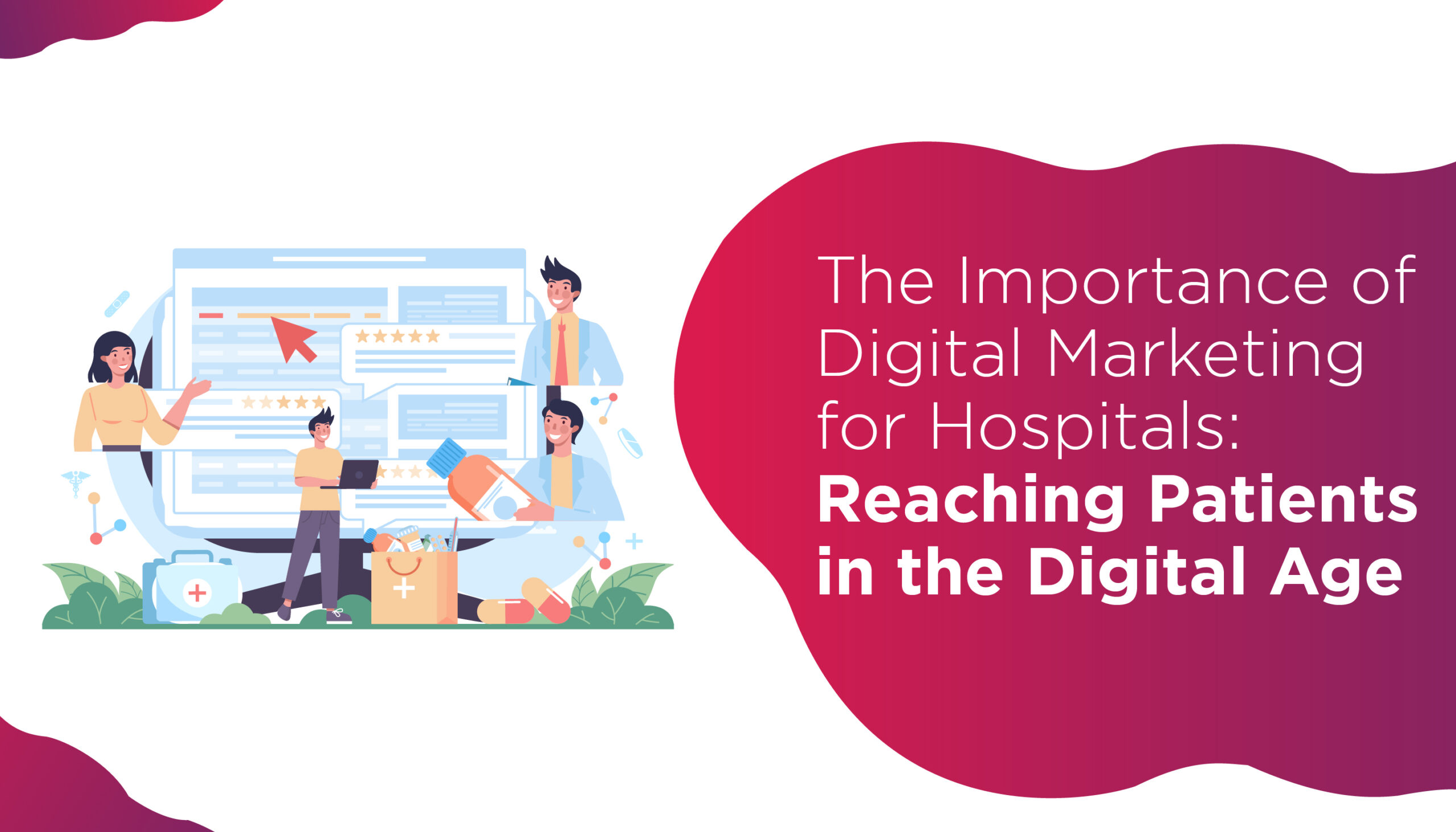
The Importance of Digital Marketing for Hospitals: Reaching Patients in the Digital Age
The importance of digital marketing for hospitals cannot be emphasised in today’s digital era. As more people turn to the internet for information and answers, hospitals must adjust their marketing strategy to efficiently reach patients.
Hospitals may use digital marketing to increase their exposure, create trust, personalise their messaging, and ultimately improve the patient experience. In this post, we’ll look at why digital marketing is important for hospitals and how it may help them interact with patients in new ways.
What is Healthcare Digital Marketing?
The act of presenting your services to potential healthcare clients using online platforms is known as a healthcare digital marketing service. You may make money with digital marketing if you offer healthcare services online.
According to study, about 88% of people seek for health information online, and 70% of those people say that the information they obtain impacts their choice of treatment. With the help of healthcare digital marketing, you can keep in touch with both present and potential patients whenever they need you.
Importance of Digital Marketing in Healthcare Services
Enhancing Visibility and Reach
One of the key advantages of digital marketing for hospitals is the opportunity to increase exposure and reach a larger audience. Hospitals may expand their online visibility and interact with potential patients who may not have noticed them otherwise by using online channels such as search engines, social media platforms, and healthcare directories.
Hospitals may boost their search engine ranks by using search engine optimisation (SEO) tactics, making it simpler for people to locate them while looking for relevant healthcare services. Furthermore, using social media platforms allows hospitals to directly communicate with patients, offer useful information, and develop a feeling of community.
Building Trust and Credibility
Establishing trust and credibility is paramount for hospitals. Patients need to feel confident in their choice of healthcare provider. Digital marketing plays a crucial role in building trust by creating informative and user-friendly websites that provide valuable content about services, medical professionals, and facilities.
Showcasing patient testimonials and success stories on websites and social media platforms can also go a long way in instilling confidence in potential patients. Furthermore, hospitals can implement online reputation management strategies to address any negative feedback promptly and demonstrate their commitment to patient satisfaction.
Targeted Marketing and Personalization
Digital marketing allows hospitals to tailor their messaging and target specific patient segments. By analysing patient data, hospitals can identify demographic information, interests, and preferences, enabling them to create personalized marketing campaigns. This level of customization helps hospitals deliver relevant content to patients, increasing the likelihood of engagement and conversion.
Email marketing campaigns can be used to stay connected with patients, providing updates, educational materials, and appointment reminders. Furthermore, digital advertisements can be customized to target specific patient segments, ensuring the right message reaches the right audience.
Improving Patient Engagement and Experience
The digital era has changed patient expectations and needs. To improve the patient experience and inspire involvement, hospitals must adopt digital marketing methods. Offering online appointment scheduling and telemedicine services is not only convenient, but it also matches the rising need for virtual healthcare choices.
Hospitals may also generate and disseminate important material via blogs, newsletters, and social media platforms, positioning themselves as reliable providers of healthcare information. Encouragement of patient ratings and feedback enables hospitals to actively listen to people, solve complaints, and continually improve their services based on patient feedback.
Reduce your marketing budget
Although certain healthcare organisations may have significant marketing expenses, the bulk of small and medium sized healthcare organisations do not. With digital marketing, brands may save a lot of money and obtain a tremendous return on investment.
Advertising on digital platforms such as social media, email, and search engines is significantly less expensive than on more conventional channels such as television, newspapers, and billboards.
Measuring and Analysing Marketing Efforts
One of the significant advantages of digital marketing is the ability to measure and analyse marketing efforts effectively. Hospitals can track key performance indicators (KPIs) such as website traffic, conversion rates, and patient engagement metrics to evaluate the effectiveness of their digital marketing campaigns.
Analytics tools provide valuable insights into patient behaviour, allowing hospitals to optimize their strategies and allocate resources more efficiently. Conducting surveys and gathering patient feedback through online channels can also provide hospitals with valuable information to enhance their services and tailor their marketing efforts.
Website that is responsive
When it comes to digital marketing, a cluttered website may disturb the user experience and raise the bounce rate. As a result, it is critical to build a website that provides an immersive experience so that when a person lands on it, they can thoroughly explore it.
Implementing the proper digital tactics while keeping the principles mentioned above in mind is vital for any healthcare marketing organisation to experiment and execute well. The epidemic has surely pushed digital technology and innovations that have opened the door in many domains, including healthcare. When compared to traditional approaches, digital marketing provides more specific targeting, lower costs, and faster results.
Conclusion
Digital marketing is of paramount importance for hospitals to reach and engage with patients in the digital age. It offers opportunities to enhance visibility, build trust, personalize messaging, enhance the patient experience, and measure marketing efforts. By embracing digital marketing strategies, hospitals can stay competitive and effectively connect with patients in a meaningful way.
Bhaav, a specialized healthcare advertising agency, understands the unique needs of hospitals in the digital landscape. They offer tailored digital marketing solutions that cater to the specific requirements of hospitals, ensuring effective patient outreach and engagement.
With their expertise in digital marketing, Bhaav assists hospitals in optimizing their online presence, implementing data-driven campaigns, enhancing patient experience, and achieving measurable results in the ever-evolving healthcare industry.
FAQ’s
Q: Why is digital marketing important for hospitals?
A: Digital marketing is important for hospitals as it helps them reach and engage with patients in the digital age, enhancing visibility and providing opportunities for personalized messaging.
Q: How does digital marketing improve a hospital’s visibility?
A: Digital marketing improves a hospital’s visibility by leveraging online channels such as search engines and social media platforms to reach a wider audience and increase online presence.
Q: Can digital marketing help hospitals build trust with patients?
A: Yes, digital marketing helps hospitals build trust by creating informative websites, showcasing patient testimonials, and actively managing their online reputation.
Q: How does digital marketing enhance the patient experience?
A: Digital marketing enhances the patient experience by offering online appointment scheduling, telemedicine services, and delivering valuable content through blogs and newsletters.
Q: What role does digital marketing play in measuring marketing efforts?
A: Digital marketing allows hospitals to measure and analyse marketing efforts effectively through tracking key performance indicators (KPIs) and utilizing analytics tools for data-driven insights.
